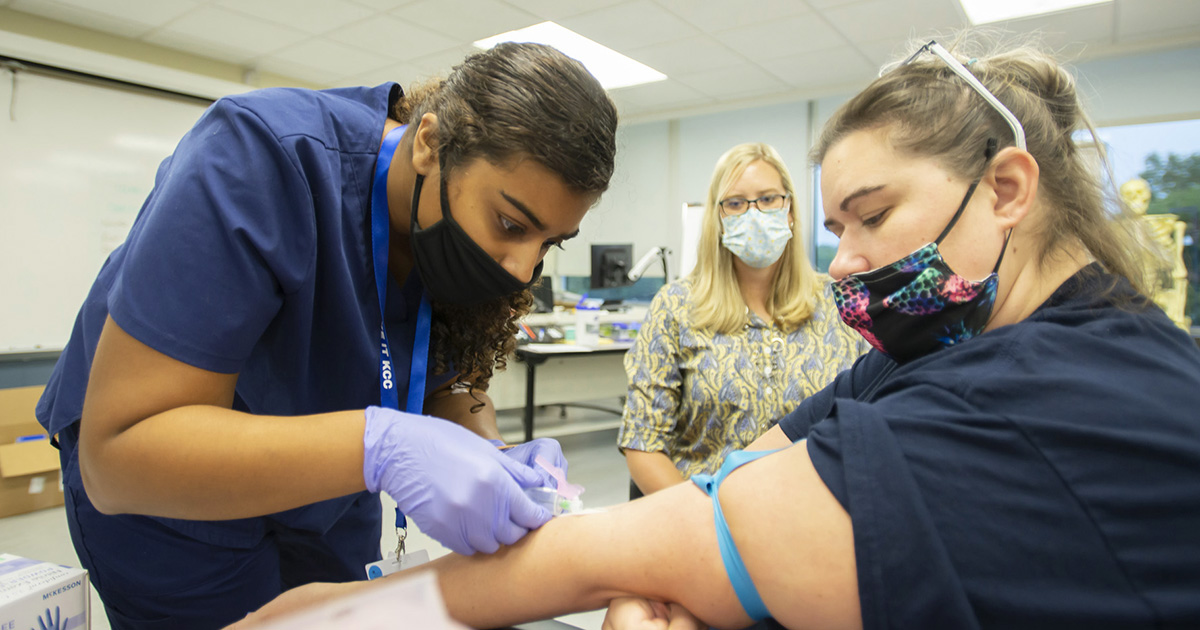The Path to Qualification: Recognizing the Phlebotomy Training Course Journey and Its Value
As you think about the path to qualification in phlebotomy, it is essential to understand the role you'll play in health care. Your training will cover vital skills, from blood collection techniques to patient interaction. Each part of the program prepares you for the obstacles in advance. However exactly what does the trip involve, and why is certification so essential for your future career? Let's explore these questions further.

The Duty of Phlebotomists in Health Care
Phlebotomists play an essential function in the healthcare system, working as the crucial link in between patients and necessary analysis testing. You'll do blood draws, making certain examples are gathered accurately and securely. Your expertise aids in detecting clinical problems, keeping track of health and wellness, and assisting therapy choices.
In your day-to-day communications, you'll need to develop trust fund with patients, making them really feel comfortable during what could be a demanding experience. You're responsible for classifying and handling examples very carefully to stop contamination or mistakes, which could affect examination results.
Past this, you'll usually work alongside doctors and registered nurses, communicating important info concerning people' conditions. By understanding your skills, you add meaningfully to client care, making you an important component of the clinical group.
Review of Phlebotomy Training Programs
When discovering phlebotomy training programs, you'll discover various kinds made to fit various routines and finding out styles. Each program helps you establish vital skills like blood collection and client interaction. Understanding these choices is key to selecting the ideal course for your job.
Kinds of Training Programs
A number of kinds of training programs are available for those looking to end up being competent in phlebotomy. In addition, some healthcare facilities and centers use on-the-job training programs, supplying functional experience while you discover. Whatever course you select, each program aims to furnish you with the needed skills for a successful phlebotomy profession.

Key Skills Established
Grasping phlebotomy calls for a collection of essential abilities that are developed through thorough training programs. You'll find out technical skills like correct blood vessel selection, needle insertion, and blood collection techniques. These hands-on practices guarantee you can execute procedures safely and successfully. Furthermore, interaction abilities are essential; you'll need to interact with people, explain procedures, and placed them at simplicity. Comprehending composition and physiology is important, too, as it aids you locate veins and understand the body's feedback to blood draws. Lastly, you'll obtain knowledge of safety protocols and infection control, assuring you maintain a sterile setting. Each of these skills is important for your success as a licensed phlebotomist, making you a beneficial property in any kind of health care setup.
Secret Elements of a Phlebotomy Course
In a phlebotomy training course, you'll focus on vital topics that prepared for your future occupation. You'll participate in hands-on training that enables you to use what you've learned in real-world settings. Both the core educational program and sensible experience are essential for your success as a phlebotomist.
Core Curriculum Introduction
While seeking a phlebotomy training program, you'll encounter a core curriculum made to outfit you with fundamental skills and knowledge. Phlebotomy Training Course. This curriculum typically consists of anatomy and physiology, concentrating on the circulatory system and comprehending blood parts. You'll likewise learn more about various types of blood collection approaches, including venipuncture and capillary slit methods
Furthermore, infection control and safety protocols are vital elements, guaranteeing you recognize just how to preserve a sterile atmosphere. You'll research patient communication, emphasizing communication and empathy, which are critical for relieving individual anxiety.
Hands-On Training Experience
Getting hands-on experience is a crucial component of your phlebotomy training program. This functional training permits you to apply what you've found out in a real-world setting, improving your abilities and confidence. You'll exercise venipuncture techniques, discover just how to handle different sorts of samplings, and obtain knowledgeable about the equipment utilized in the field. Under the assistance of seasoned teachers, you'll fine-tune your skills, guaranteeing you're gotten ready for any situation you might deal with.
In addition, you'll obtain the chance to interact with patients, which is vital for establishing your communication abilities. This mix of technical proficiency and social skills is crucial for your success as a certified phlebotomist. Inevitably, hands-on training is where concept satisfies technique, solidifying your knowledge and readiness for accreditation.
Qualification and Licensing Demands
Prior to you can view it start your job in phlebotomy, it is important to understand the certification and licensing requirements that vary by state. A lot of states need phlebotomists to hold a certification from an identified company, such as the National Phlebotomy Organization or the American Culture for Professional Pathology. These qualifications normally entail passing an exam that evaluates your understanding and abilities in the area.
In enhancement to qualification, some states have particular licensing demands. You may need to complete a specific variety of hours in clinical method, send evidence of training, or undertake a history check. It is very important to research your state's policies to make certain you fulfill all necessary criteria.
Remaining educated regarding these requirements not just helps you secure a position but also enhances your credibility as an expert. By meeting these demands, you'll be well on your way to a successful occupation in phlebotomy.
Hands-On Training and Practical Experience
Hands-on training and practical experience are crucial components of your phlebotomy education and learning, as they allow you to use theoretical expertise in real-world circumstances. During your training, you'll engage in supervised venipuncture, discover correct strategies, and come to be aware of numerous blood collection equipment. This direct involvement is crucial for developing your self-confidence and refining your skills.
You'll function carefully with seasoned specialists that can assist you through the nuances of individual communication and example handling. Each practice not only strengthens your understanding but additionally prepares you for the busy atmosphere of health care settings.
Additionally, numerous programs integrate scientific rotations, allowing you to experience varied settings, from medical facilities to outpatient centers. This direct exposure aids you adjust to different obstacles and person requirements, ensuring you're well-prepared for your future duty. Embrace these possibilities, as they're essential to becoming an experienced and thoughtful phlebotomist.
Challenges Faced During Training
While getting hands-on experience is necessary, it is very important to identify the obstacles that can arise during your phlebotomy training. You might encounter anxiousness when executing treatments on real individuals, especially if you're websites new to the environment. The stress to obtain everything right can be frustrating. In addition, grasping the skills required for blood attracts takes practice; you might have problem with strategy initially.
Time administration can additionally be an obstacle, as balancing concept, useful sessions, and personal commitments can really feel intimidating. You might deal with differing learning paces among your peers, causing sensations of self-doubt if you believe you're dropping behind. Lastly, adjusting to the various personalities of trainers can be challenging, as each may have an one-of-a-kind teaching style.
Identifying these barriers early on can prepare you for success and help you create durability throughout your training trip.
Profession Opportunities After Qualification

As you gain experience, you could even think about specializing in areas like pediatric or senior citizen phlebotomy, satisfying certain individual needs. Some phlebotomists choose this to advance their careers by becoming research laboratory specialists or seeking more education in health care fields.
Furthermore, your qualification can result in functions in training or managing brand-new phlebotomists, enabling you to share your understanding. With the medical care sector continuously growing, your skills will always be in need, leading the means for a secure and satisfying job. Accept the chances waiting for you!
Often Asked Inquiries
What Is the Typical Duration of a Phlebotomy Educating Training Course?
Phlebotomy training courses generally last around four to eight weeks. You'll participate in hands-on method, class direction, and on the internet understanding. Finishing this training prepares you for accreditation and a satisfying job in health care.
Are Online Phlebotomy Courses Available?
Yes, on-line phlebotomy programs are available. They offer adaptability and benefit, permitting you to research at your very own pace. Just validate the program is approved to meet qualification needs and obtain useful abilities for your occupation.
How Much Does Phlebotomy Training Typically Expense?
Phlebotomy training typically sets you back in between $700 and $2,500, depending upon the program and area. You need to think about elements like training course length, included products, and hands-on experience when picking the best training for you.
What Are Common Prerequisites for Phlebotomy Training?
Typical prerequisites for phlebotomy training frequently consist of a senior high school diploma or GED, booster shots, and a background check. Some programs may likewise require basic medical care expertise or accreditations, guaranteeing you're prepared for hands-on training.
Can I Function While Finishing My Phlebotomy Training?
Yes, you can function while completing your phlebotomy training. Lots of students balance work with their studies, yet ensure to handle your time successfully to assure you fulfill both work and training commitments successfully.
Comments on “How a Phlebotomy Training Course Sets the Stage for a Promising Healthcare Career”